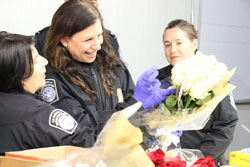For some of us, the excitement surrounding Valentine’s Day makes our hearts beat faster. This is certainly true for CBP agriculture specialists

Secretary Elaine Duke (center) examines a
bunch of imported cut roses, with CBP
agriculture specialists in Miami.
(CBPAS), because the six-week period between New Year’s Day and February 14 are the busiest weeks of the year.
The pace is especially hectic in Miami, which is the nation’s main gateway for roses and other cut flowers imported from Central and South America – stems destined for sweethearts, spouses, and significant others nationwide.
During that six-week period last year, CBPAS processed nearly 1.1 billion stems of cut flowers; more than 954 million of these were screened at the Miami Airport and its associated warehouses. Nationwide, of the 2,033 interceptions of pests and diseases, 1,085 of these were “actionable” – significant enough to order the shipment to be subject to treatment, re-exportation, or destruction.
Some of these insects are nearly invisible to the naked eye, making inspections that much more arduous and exacting. The stakes are high. While the vast majority of flowers entering the country are safe, even one “hitchhiking” pest or plant disease can cause serious destruction.
Once an invasive insect takes hold, it can cause serious destruction. Japanese beetles, for example, feast on more than 400 plant species and are believed to have entered the United States more than a century ago in a shipment of iris bulbs. Floral imports can also carry bacterial and fungal diseases and even viruses that could damage U.S. agriculture.
CBPAS undergo rigorous training and have extensive experience in agriculture and biological inspection. They can also apply their skills to recognizing and preventing the entry of organisms that could be used for biological warfare or terrorism.
So the next time you ponder buying that bouquet of flowers, please remember how dedicated and diligent our CBP agriculture specialists are in protecting our floral industry, our agriculture, our natural resources, and our homeland.


